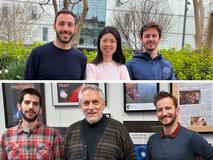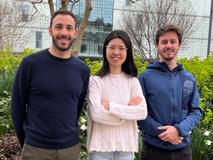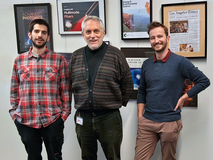CHF 40,000 for a next-generation district heating design software and making hydrogen production sustainable
13.06.2023
Planeto and REMA win Venture Kick's second stage of financial and entrepreneurial support. Their projects develop a thermal energy system simulation assistant to decarbonize the heating energy supply in buildings and, make green hydrogen production affordable and efficient.
 |
 Planeto: from left to right CEO & Co-Founder Stefano Cozza, Data Scientist Xiang Li, and CTO & Co-Founder Jonathan Chambers
|
 REMA's founders: Ioakeim Sioutis (Lead Engineer), Prof. Demetri Psaltis (Advisor), and Steven Schenk (CEO)
|
Planeto: Next-generation district heating design software to accelerate the energy transition
Decarbonizing the heating energy supply in buildings is an urgent need to meet global climate and energy security targets. District heating and cooling networks (DHC) are recognized as an essential solution because it allows connecting buildings to renewable energy sources. However, adoption of the technology is very low. Energy utilities and public authorities struggle to plan and develop new DHC projects.
Planeto's Thermal Energy System Simulation Assistant (TESSA) software addresses this exact problem, by digitalizing DHC planning. It combines comprehensive building stock geo-data and modeling with an innovative algorithm for DHC network route planning. It allows a user to initiate a DHC model within a few minutes, by embedding data and knowledge in the platform transparently for users. The current team consists of the two co-founders Stefano Cozza and Jonathan Chambers, and the team member Xiang Li. Both co-founders are still researchers at the University of Geneva's Energy Efficiency Group. TESSA provides several technical innovations. The modeling input data can be generated for entire countries which allows a project to be started immediately without a data collection step, saving a significant amount of time. TESSA is built as a set of software modules based on our validated methodologies, integrating both state-of-the-art building physics knowledge and machine learning methods. This increases reproducibility and decreases uncertainty. The algorithms developed for thermal network routing and energy supply/demand modeling are faster and more flexible than existing methods. In terms of market potential, recent developments in climate policy as well as geopolitics have spurred interest in the transition away from fossil fuels in heating. Globally the DHC market is expected to grow by USD 40 billion in the next 5 years, while in Switzerland the heat supplied by DHC must grow 10x to meet the Energy Strategy 2050 targets.
They will use the Venture Kick funding for business development such as sales, marketing, and IP strategy, and for IT development, providing the software in a cloud environment and meeting industry cybersecurity standards.
REMA: Making green hydrogen production affordable and efficient
REMA is pioneering the universal use of green hydrogen in a world that no longer relies on carbon and fossil fuels. Its mission is to develop and supply the most efficient and cost-effective water electrolyzers for the production of green hydrogen. Using fluid mechanics, REMA is able to remove the costly and fragile membrane of conventional electrolyzers maintaining high purity, operating at higher temperature thus higher efficiency at the lowest cost.
The demand for sustainable energy solutions is rapidly increasing, and hydrogen is considered a crucial element in achieving the energy transition. However, the high cost of green hydrogen has limited its widespread adoption. REMA's patented membrane-less electrolysis technology offers a solution that significantly reduces costs and increases efficiency compared to existing electrolyzers.
REMA's technology achieves an efficiency rate of 85-95%, outperforming current electrolyzers by 10-20%. It also offers a 30-40% reduction in price and eliminates the need for membranes, simplifying construction and industrialization processes. This innovative approach meets market needs and supports sustainability goals.
The startup's founding team comprises Steven Schenk, the CEO, and Ioakim Sioutis, the CTO. Additionally, the team includes Dr. Pooria Hadikhani fluid mechanics expert, Prof. Demetri Psaltis, Director of the EPFL's Optics Lab and an esteemed authority in optofluidics and Prof. Nikos Stergiopoulos, an EPFL professor and founder of Comphya, and Rheon Medical. They contribute with their valuable insights.
REMA will invest the funds awarded by Venture Kick to finalize the membrane-less stack prototype and validate long-term performance thus allowing them to perform customer relations and sales development.
www.h2rema.ch
Decarbonizing the heating energy supply in buildings is an urgent need to meet global climate and energy security targets. District heating and cooling networks (DHC) are recognized as an essential solution because it allows connecting buildings to renewable energy sources. However, adoption of the technology is very low. Energy utilities and public authorities struggle to plan and develop new DHC projects.
Planeto's Thermal Energy System Simulation Assistant (TESSA) software addresses this exact problem, by digitalizing DHC planning. It combines comprehensive building stock geo-data and modeling with an innovative algorithm for DHC network route planning. It allows a user to initiate a DHC model within a few minutes, by embedding data and knowledge in the platform transparently for users. The current team consists of the two co-founders Stefano Cozza and Jonathan Chambers, and the team member Xiang Li. Both co-founders are still researchers at the University of Geneva's Energy Efficiency Group. TESSA provides several technical innovations. The modeling input data can be generated for entire countries which allows a project to be started immediately without a data collection step, saving a significant amount of time. TESSA is built as a set of software modules based on our validated methodologies, integrating both state-of-the-art building physics knowledge and machine learning methods. This increases reproducibility and decreases uncertainty. The algorithms developed for thermal network routing and energy supply/demand modeling are faster and more flexible than existing methods. In terms of market potential, recent developments in climate policy as well as geopolitics have spurred interest in the transition away from fossil fuels in heating. Globally the DHC market is expected to grow by USD 40 billion in the next 5 years, while in Switzerland the heat supplied by DHC must grow 10x to meet the Energy Strategy 2050 targets.
They will use the Venture Kick funding for business development such as sales, marketing, and IP strategy, and for IT development, providing the software in a cloud environment and meeting industry cybersecurity standards.
REMA: Making green hydrogen production affordable and efficient
REMA is pioneering the universal use of green hydrogen in a world that no longer relies on carbon and fossil fuels. Its mission is to develop and supply the most efficient and cost-effective water electrolyzers for the production of green hydrogen. Using fluid mechanics, REMA is able to remove the costly and fragile membrane of conventional electrolyzers maintaining high purity, operating at higher temperature thus higher efficiency at the lowest cost.
The demand for sustainable energy solutions is rapidly increasing, and hydrogen is considered a crucial element in achieving the energy transition. However, the high cost of green hydrogen has limited its widespread adoption. REMA's patented membrane-less electrolysis technology offers a solution that significantly reduces costs and increases efficiency compared to existing electrolyzers.
REMA's technology achieves an efficiency rate of 85-95%, outperforming current electrolyzers by 10-20%. It also offers a 30-40% reduction in price and eliminates the need for membranes, simplifying construction and industrialization processes. This innovative approach meets market needs and supports sustainability goals.
The startup's founding team comprises Steven Schenk, the CEO, and Ioakim Sioutis, the CTO. Additionally, the team includes Dr. Pooria Hadikhani fluid mechanics expert, Prof. Demetri Psaltis, Director of the EPFL's Optics Lab and an esteemed authority in optofluidics and Prof. Nikos Stergiopoulos, an EPFL professor and founder of Comphya, and Rheon Medical. They contribute with their valuable insights.
REMA will invest the funds awarded by Venture Kick to finalize the membrane-less stack prototype and validate long-term performance thus allowing them to perform customer relations and sales development.
www.h2rema.ch


